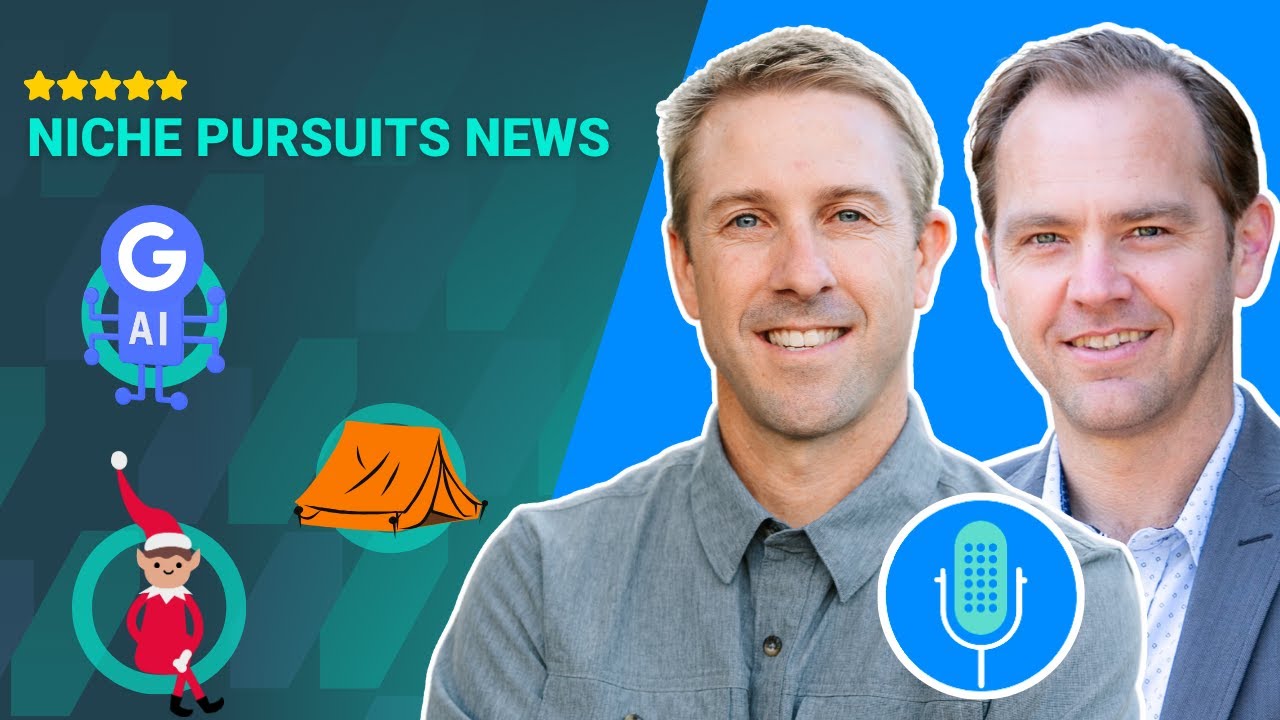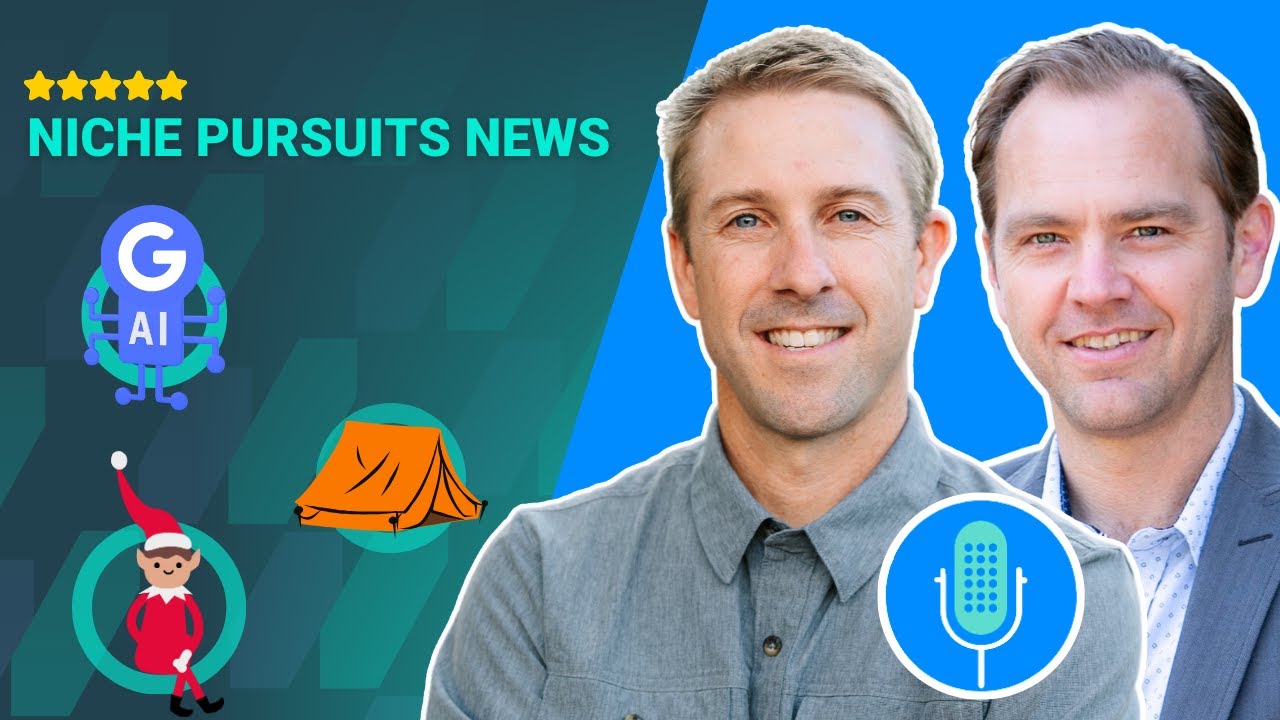Hi there! Welcome to another episode of This Week in Niche Pursuits News. In this week’s podcast, Spencer and Jared cover a range of topics from Google’s plans to phase out third-party cookies, the consequences of copying content, and the rise of AI-generated content. They also dive into the Amazon Influencer Program and the concept of “side hustle syndrome”. Throughout the episode, they touch on various websites, such as Elfster.com and CampsitePhotos.com, and discuss their monetization strategies and visitor traffic. Additionally, they share their own experiences with the Amazon influencer program and the earnings they’ve generated so far. It’s an informative and engaging episode that highlights the latest news in SEO, AI, and all things related to content creation and website ownership. So, grab a cup of coffee and tune in to stay up to date with the ever-changing landscape of digital marketing.
Google’s Plan to Deprecate Third-Party Cookies
Google’s decision to phase out third-party cookies has been in the works for some time now, but it’s finally becoming a reality. Starting on January 4, 2024, Google plans to remove third-party cookies for Chrome users. This is a significant change that will have a profound impact on advertisers and website owners alike. Let’s explore what this means for the digital advertising industry.
Phasing Out Third-Party Cookies
Third-party cookies are snippets of code that track user behavior across different websites. They have been widely used by digital advertisers to target specific individuals based on their browsing habits and preferences. However, third-party cookies have faced criticism for their potential privacy implications. Users have become increasingly concerned about how their personal data is being collected and used.
To address these concerns, Google took the decision to deprecate third-party cookies. Initially, only 1% of randomly selected Google Chrome users will experience the impact of this change. However, Google aims to fully phase out third-party cookies by the end of 2024 or 2025.
Manual Penalty for Content Duplication
In a recent incident, a content creator named Jake Ward generated a lot of attention by tweeting about a strategy to steal traffic from a competitor using AI-generated content. However, his tweet caught Google’s attention, and his website was hit with a manual penalty for content duplication. This penalty resulted in a significant drop in traffic for his website.
This incident serves as a reminder that sharing strategies that go against Google’s guidelines can have serious consequences. It’s crucial for website owners and content creators to be cautious about their tactics, especially in a public manner.
Uncertainty for Advertisers and Website Owners
The deprecation of third-party cookies raises a lot of uncertainty for advertisers and website owners. Advertisers may no longer be able to target individuals based on their private data, leading to reduced ad spend. This can have a significant impact on advertising campaigns and the effectiveness of targeting strategies.
Website owners may also experience a decrease in ad revenue as the removal of third-party cookies can result in lower RPMs (revenue per thousand impressions). This change could affect the monetization strategies of many websites and force them to explore alternative revenue streams.

The Impact of Google’s Third-Party Cookie Deprecation
The phasing out of third-party cookies will have far-reaching implications for the digital advertising ecosystem. Let’s explore two key areas that will be impacted:
Reduced Ad Spend and Targeting
Advertisers heavily depend on third-party cookies to target their advertising campaigns effectively. With the removal of third-party cookies, advertisers may struggle to reach their desired target audience. Advertisers will need to find new ways to identify and target potential customers, potentially leading to a decrease in ad spend.
Decrease in Ad Revenue for Website Owners
Website owners rely on ad revenue to monetize their platforms. However, with the removal of third-party cookies, ad networks will have a harder time delivering targeted ads to users. This can result in a decrease in ad revenue for website owners as RPMs may go down. Website owners will need to find alternative monetization strategies to compensate for this revenue loss.
Lessons Learned from Content Duplication Penalty
The incident involving Jake Ward’s content duplication strategy highlights some valuable lessons for content creators and website owners. It’s essential to understand the potential consequences of sharing strategies that may go against Google’s guidelines:
Traffic Boost Strategy Backfires
While Jake Ward’s tweet about his traffic-boosting strategy initially attracted a lot of attention, it ultimately led to a manual penalty from Google. This penalty resulted in a significant drop in traffic for his website. It serves as a reminder that strategies that may seem effective at first can have negative long-term consequences.
Be Cautious in Sharing Strategies Contrary to Google’s Guidelines
Website owners and content creators should approach sharing strategies that go against Google’s guidelines with caution. Publicly flaunting tactics that violate these guidelines can lead to penalties and negative impacts on website traffic and search engine rankings.
Unclear Response from Google
The response from Google regarding the content duplication penalty remains somewhat unclear. While the manual penalty was handed out, the exact reasons behind it and the subsequent actions taken by Google are not fully known. Understanding Google’s response to such incidents can help content creators navigate potential pitfalls more effectively.
Google’s Shift in Approach to AI Content
Google’s approach to AI-generated content has undergone a significant shift in recent years. The focus has shifted towards providing helpful and relevant content for users. Google maintains an index of around 400 billion documents and uses sophisticated algorithms to filter out irrelevant and spammy content.
Despite Google’s efforts, there has been a rise in the number of spammy results ranking on the first page of search engine results. This raises concerns about the effectiveness of AI-generated content and its impact on the overall quality of search engine rankings.
Factors Affecting AI Content Ranking
The factors influencing the ranking of AI-generated content go beyond simply matching search queries with relevant keywords. Here are some crucial factors that determine the success and longevity of AI content:
Role of Brands in Rankings
Brands play a significant role in search engine rankings. Searches related to specific brands signal relevance to Google, which can impact the ranking of AI-generated content.
Ranking Decline after Initial Success
AI-generated content often experiences a decline in traffic and rankings after an initial period of success. This decline can be attributed to factors such as changing search trends, updated algorithms, and evolving user preferences. Continuous optimization and adaptation are necessary to maintain long-term success.
Impact of User Metrics
User metrics, such as click-through rates, bounce rates, and time on site, can influence the ranking of AI content. Positive user engagement signals to search engines that the content is valuable and relevant, leading to higher rankings.
Amazon Influencer Program and Side Hustle Syndrome
The podcast episode also delves into the Amazon influencer program and the concept of “side hustle syndrome.” Spencer and Jared share their experiences with the Amazon influencer program, highlighting both the successes and challenges they have encountered.
Success and Earnings in the Christmas Season
The Amazon influencer program can be highly lucrative, especially during the Christmas season. Spencer reports significant sales and earnings during this time, reflecting the increased amount of online shopping. The program has the potential to have a significant impact on participants’ finances and overall income.
Decrease in Revenue
However, Jared shares his experience of a decrease in earnings due to a change with his star product. This highlights the volatility and unpredictability of revenue streams tied to affiliate marketing programs. Participants need to be prepared for fluctuations in earnings and adapt their strategies accordingly.
Close to $7,000 in Last 30 Days
Despite the challenges, both Spencer and Jared have seen considerable success with the Amazon influencer program. Jared’s earnings over the last 30 days are closing in on $7,000, showcasing the program’s revenue potential.
Mention of Co.uk
During the podcast episode, the website Co.uk is mentioned in the context of the discussion. Further details about this reference are not provided, but it serves as an example of the diversity of niche websites and their various revenue streams.
Elfster.com: Organizing Secret Santa Gift Exchanges
Moving on from the Amazon influencer program, the podcast touches on Elfster.com, a website for organizing Secret Santa gift exchanges. The platform experiences a significant surge in traffic during the holiday season, catering to millions of visitors. Elfster.com monetizes its platform through affiliate marketing, sponsored placements, and a pro membership option.
CampsitePhotos.com: Website for Campsite Information
Lastly, the podcast highlights CampsitePhotos.com, a website that provides photos and information on campsites in the United States. The site attracts around 200,000 monthly visitors, catering to a niche audience interested in camping. CampsitePhotos.com monetizes its platform through various channels, including ads, membership options, and a campsite assist feature.
In conclusion, Google’s plan to deprecate third-party cookies will bring significant changes to the digital advertising landscape. Advertisers and website owners will need to adapt to these changes and explore alternative strategies to maintain revenue and engagement. The incident surrounding content duplication serves as a cautionary tale, emphasizing the importance of adhering to Google’s guidelines. Additionally, understanding Google’s shift in approach to AI content and the various factors influencing AI-generated content rankings can help content creators navigate the evolving digital landscape successfully.
